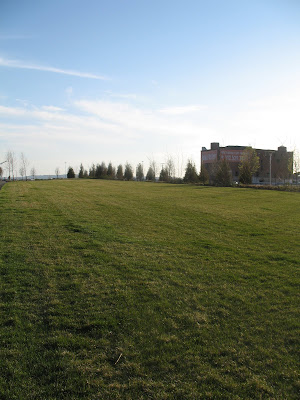(our local playground):

within easy walking distance of our school we discovered structures and sites in which the children could climb, run, hide, and engage in dramatic play as far as their imaginations could stretch.
behold, the log ramps at the IKEA river walk:
 the children love to run, climb, and jump across these log covered ramps. it's great exercise, but even greater fodder for the imagination.
the children love to run, climb, and jump across these log covered ramps. it's great exercise, but even greater fodder for the imagination.adjacent to the ramps is this highly intriguing structure:
 a ship's engine? a cannon? a battleship? though this particular structure isn't for climbing it serves as excellent inspiration for dramatic play.
a ship's engine? a cannon? a battleship? though this particular structure isn't for climbing it serves as excellent inspiration for dramatic play.this old pier, while also not suitable for climbing, running or even walking on, is nonetheless an intriguing backdrop to any game, as is the surrounding harbor:

adding to the charm of this play space are these abandoned warehouses, water taxis, and the not-too-distant statue of liberty:

finally, just across the river walk path we have an expansive field of grass upon which the children can run, hide, tumble, wrestle, roll, jump and, well.... play!




Changes not only bring freshness but also make us more innovative to use the new things in new way. To make progress in the life, we should develop the capability to accept changes. Indeed many of the posted ideas are unique where children would love to spend more than permissible time.
ReplyDeleteagreed - thanks for posting!
ReplyDeleteThose are great spaces -- people get so focused on the traditional playground for children! But as much as children love playgrounds, an open-ended space is brilliant.
ReplyDeleteIt is not only safe but also makes the children more interested to perform various unconventional exercises. It saves the time that is consumed to transport the children to the distant playground. In some places, kids themselves discover the measure to recreate themselves.
ReplyDelete